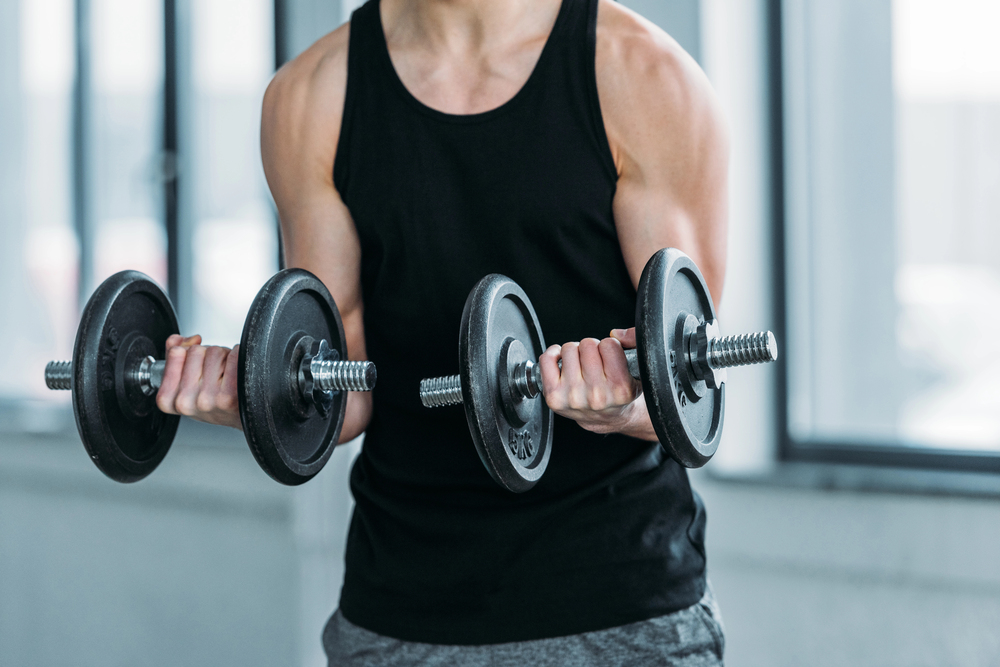Finasteride and Bodybuilding: Can It Affect Muscle Growth?

Content by

Last Updated
Start a Consultation Today
Science means that hair loss can be optional...
No fancy packaging. No unwanted subscriptions. Finasteride delivered discreetly.
When it comes to bodybuilding, every fitness enthusiast knows that muscle growth isn't just about lifting weights. It involves a strict diet and intense exercise routines. However, some medications can affect muscle mass and growth. One medication that is often misunderstood by the bodybuilding community is Finasteride, which is commonly used for treating male pattern baldness.
Bodybuilders, athletes and fitness enthusiasts can take Finasteride to prevent further hair loss, but can it affect or influence muscle mass and growth? In this article, we explain how Finasteride works, its side effects, how it affects muscle growth and what you can do to avoid the impact of muscle growth while taking Finasteride.
Table of Contents
- How Does Finasteride Work?
- The Link Between DHT and Muscle Growth
- Side Effects of Finasteride
- Does Finasteride Affect Muscle Growth?
- What Can I Do To Reduce The Impacts of Finasteride on Muscle Growth?
- Minoxidil: An Alternative to Finasteride
How Does Finasteride Work?
Finasteride is a prescription-only medication for treating male androgenetic alopecia (male pattern baldness), a common hair loss condition in men. Balding around the crown and a receding hairline are the main indicators of male pattern baldness.
Finasteride belongs to a class of medication called 5-alpha reductase inhibitors. It works by blocking the action of an enzyme called 5-alpha-reductase. This enzyme converts testosterone, the primary male sex hormone, into another hormone called dihydrotestosterone (DHT). However, DHT has been known for stopping hair growth. Finasteride comes in oral tablet form and one Finasteride 1mg tablet is taken once daily to block DHT and improve hair growth. [1]
The Link Between DHT and Muscle Growth
DHT is an androgen, which is a sex hormone. It plays a significant role in the development of male characteristics, including muscle growth. As mentioned earlier, it is derived from testosterone through the action of the 5-alpha reductase enzyme. Although DHT is more potent than testosterone in its androgenic effects, its direct role in muscle growth is distinct and somewhat more complex.
Testosterone is widely recognised for its ability to increase muscle mass and strength by promoting protein synthesis and the growth of muscle cells. While DHT derives from the same hormonal pathway as testosterone, it primarily binds to androgen receptors in tissues like skin, hair follicles, and the prostate gland rather than muscle tissue. In muscle tissue, DHT demonstrates a slightly different mechanism, as it does not directly stimulate muscle growth to the extent that testosterone does. Further research is required to fully understand the link between DHT and muscle growth.
Side Effects of Finasteride
Like any prescription medication, it comes with possible side effects. The side effects of Finasteride may include [2]:
- Loss of sexual desire
- Erectile dysfunction
- Problems with ejaculation (decreased semen volume)
- Testicular pain
- Depression
For a full list of side effects, read the patient information leaflet. Most users don’t experience any side effects while taking Finasteride at the right dosage. Taking more than the recommended dosage increases the risk of side effects and complications.
Does Finasteride Affect Muscle Growth?
By decreasing DHT levels, Finasteride could theoretically impair muscle hypertrophy or the ability to gain muscle mass. Research on whether Finasteride affects muscle growth directly is limited. Several studies have indicated that Finasteride does not significantly impair muscle mass or strength gains. These findings suggest that while DHT may enhance androgenic effects, its absence or reduced levels might not necessarily prevent muscle development, as sufficient anabolic conditions are maintained by testosterone itself.
One study shows that 5-alpha reductase inhibition does not adversely affect muscle mass. A group of male participants were given Dutasteride 2.5mg and testosterone enanthate and another group was given a placebo and testosterone enanthate. The study found inhibiting DHT production did not alter the ability of testosterone to modulate muscle strength. [3]
While Finasteride 1mg wasn’t used in the study, Finasteride and Dutasteride belong to the same class of medication and work similarly. However, Dutasteride is more potent than Finasteride, meaning that users of Finasteride 1mg are less likely to be affected regarding muscle growth.
Other studies suggest a different narrative, where users experience difficulties in gaining or maintaining muscle mass while taking Finasteride. These cases might be due to each person's unique hormone levels and genetics, which influence how they react to changes in DHT levels.
What Can I Do To Reduce The Impacts of Finasteride on Muscle Growth?
Whether you’re a bodybuilder, athletic or fitness enthusiast, it’s crucial to weigh the benefits of Finasteride with its potential risks. If you are taking or considering Finasteride for hair growth improvements but are concerned about its impact on muscle growth, there are several ways you can help to avoid this potential side effect:
- Consult Your Doctor - Before starting or stopping Finasteride, talk to your doctor about your concerns related to muscle growth and any other side effects. They can provide guidance tailored to your health profile.
- Monitor Your Testosterone Levels - Since Finasteride can alter hormone levels, monitoring testosterone and DHT levels can help determine how the drug is affecting your body, allowing adjustments as necessary. Regular blood tests are the most common way to monitor testosterone and DHT levels.
- Maintain a Healthy Diet - Ensure your diet supports muscle growth, eat high-protein foods with a balance of carbohydrates and fats. Consider vitamin D and omega-3 fatty acids, which support hormone function and overall health.
- Take Supplements - Supplements including creatine might help compensate for any potential reduction in anabolic drive due to lower DHT levels.
- Consider a Finasteride Alternative - If Finasteride is affecting your muscle mass or growth, there are alternative options available at Chemist Click such as Topical Minoxidil Spray.
Minoxidil: An Alternative to Finasteride
Minoxidil is often considered to be a suitable alternative to Finasteride for men who are trying to improve muscle mass whilst suffering hair loss. While Finasteride is effective in treating male pattern baldness, it can potentially affect muscle growth due to its mechanism of altering hormone levels. Minoxidil, on the other hand, operates through a different pathway which primarily enhances blood flow to hair follicles, promoting hair growth without directly affecting DHT levels. For this reason, Minoxidil is sometimes deemed to be a more favourable option for both bodybuilders and fitness enthusiasts.
Unlike Finasteride, Minoxidil 2% can also be taken by both men and women who suffer from androgenetic alopecia, making it an accessible solution for hair rejuvenation without impacting hormonal health. Please note that higher strengths of Minoxidil are only suitable for men.
You should always consult with your healthcare provider before taking Finasteride or Minoxidil to discuss your hair loss condition, medical history and any other specific health factors. At Chemist Click, we offer free online consultations before you purchase hair loss treatments. This allows our qualified pharmacists to approve the best hair loss treatment according to your circumstances.
Sources
- MedlinePlus. (2022). Finasteride. Retrieved 25th October 2024, from: https://medlineplus.gov/druginfo/meds/a698016.html
- NHS. (2023). Side Effects of Finasteride. Retrieved 25th October 2024, from: https://www.nhs.uk/medicines/finasteride/side-effects-of-finasteride/
- Razzak, M. (2012). 5α-Reductase Inhibition Does Not Adversely Affect Muscle Mass. Retrieved 25th October 2024, from: https://www.nature.com/articles/nrurol.2012.46
Whilst all of our content is written and reviewed by healthcare professionals, it is not intended to be substituted for or used as medical advice. If you have any questions or concerns about your health, please speak to your doctor.
